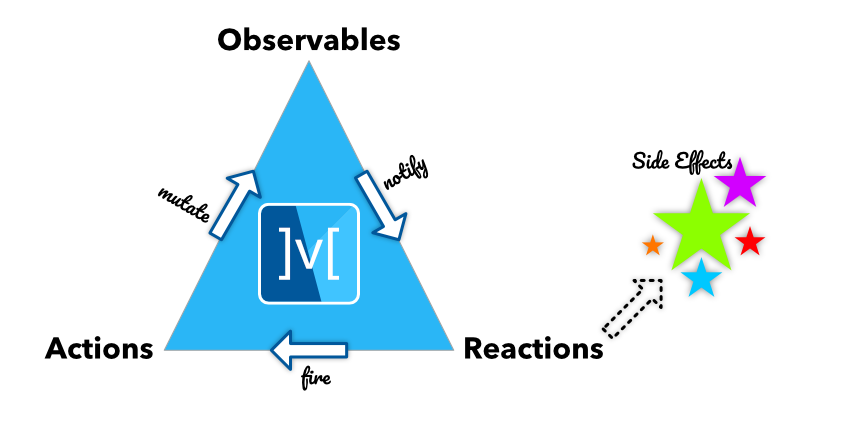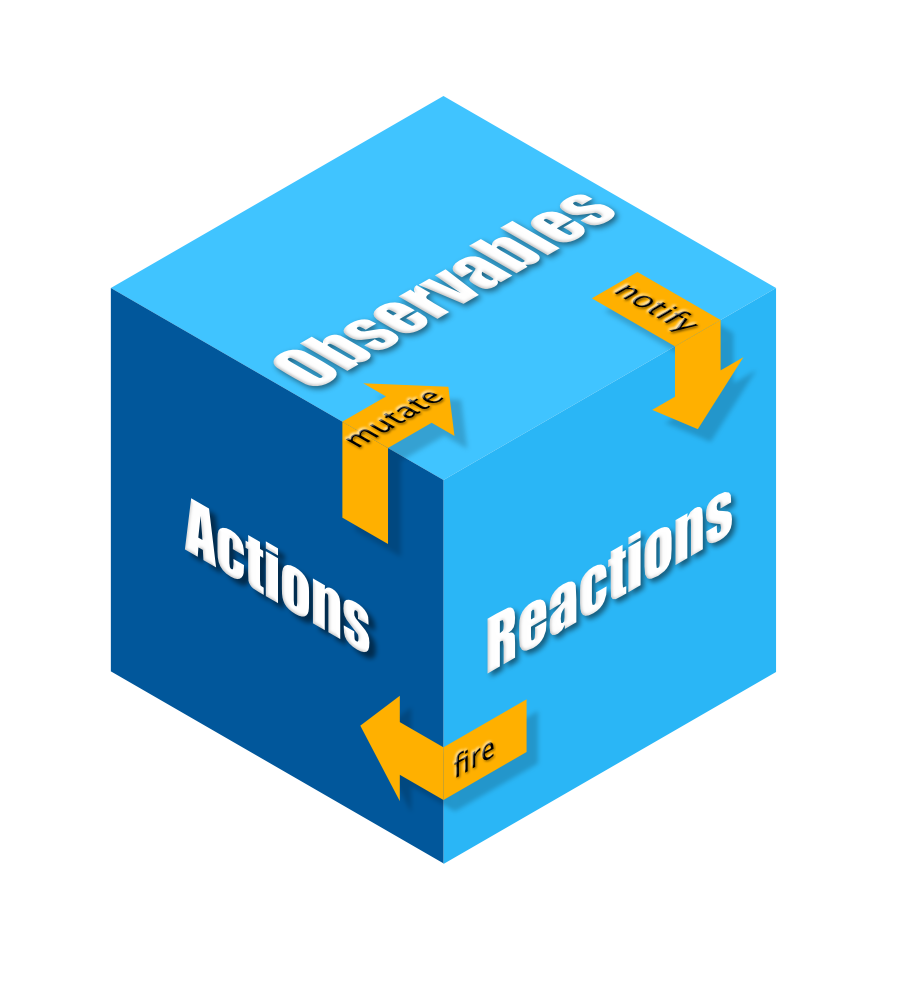Core Concepts

At the heart of MobX are three important concepts: Observables, Actions and Reactions.
Observables
Observables represent the reactive-state of your application. They can be simple scalars to complex object trees. By defining the state of the application as a tree of observables, you can expose a reactive-state-tree that the UI (or other observers in the app) consume.
The term
reactive datameans that a change to data causes a notification to be fired to every interested observer. It is the application of the classic Observer Design Pattern.
A simple reactive-counter is represented by the following observable:
import 'package:mobx/mobx.dart';
final counter = Observable(0);
More complex observables, such as classes, can be created as well.
class Counter {
Counter() {
increment = Action(_increment);
}
final _value = Observable(0);
int get value => _value.value;
set value(int newValue) => _value.value = newValue;
late Action increment;
void _increment() {
_value.value++;
}
}
On first sight, this does look like some boilerplate code which can quickly go out of hand!
This is why we added 
import 'package:mobx/mobx.dart';
part 'counter.g.dart';
class Counter = CounterBase with _$Counter;
abstract class CounterBase with Store {
int value = 0;
void increment() {
value++;
}
}
Note the use of annotations to mark the observable properties of the class. Yes, there is some header boilerplate here but its fixed for any class. As you build more complex classes this boilerplate will fade away and you will mostly focus on the code within the braces.
Note: Annotations are available via the 
The above code is part of the Counter Example.
For those who have experience with the JavaScript version of MobX, it's important to note that deep observability doesn't apply in the Dart version of MobX. This is because Dart is a statically typed language and there's no support for reflection (no
dart:mirrors) in Flutter applications. Therefore, if a complex object is marked as@observablethen MobX will not be able to automatically track changes to the object's fields. Should you need change tracking at the field level, it's better to mark them individually with the@observableannotation.
Computed Observables
What can be derived, should be derived. Automatically.
The state of your application consists of core-state and derived-state. The core-state is state inherent to the domain you are dealing with. For example, if you have a Contact entity, the firstName and lastName form the core-state of Contact. However, fullName is derived-state, obtained by combining firstName and lastName.
Such derived state, that depends on core-state or other derived-state is called a Computed Observable. It is automatically kept in sync when its underlying observables change.
State in MobX = Core-State + Derived-State
import 'package:mobx/mobx.dart';
part 'contact.g.dart';
class Contact = ContactBase with _$Contact;
abstract class ContactBase with Store {
String firstName;
String lastName;
String get fullName => '$firstName, $lastName';
}
In the example above fullName is automatically kept in sync if either firstName and/or lastName changes.
Actions
Actions are how you mutate the observables. Rather than mutating them directly, actions
add a semantic meaning to the mutations. For example, instead of just doing value++,
firing an increment() action carries more meaning. Besides, actions also batch up
all the notifications and ensure the changes are notified only after they complete.
Thus the observers are notified only upon the atomic completion of the action.
Note that actions can also be nested, in which case the notifications go out when the top-most action has completed.
final counter = Observable(0);
final increment = Action((){
counter.value++;
});
When creating actions inside a class, you can take advantage of annotations!
import 'package:mobx/mobx.dart';
part 'counter.g.dart';
class Counter = CounterBase with _$Counter;
abstract class CounterBase with Store {
int value = 0;
void increment() {
value++;
}
}
Reactions
Reactions complete the MobX triad of observables, actions and reactions. They are
the observers of the reactive-system and get notified whenever an observable they
track is changed. Reactions come in few flavors as listed below. All of them
return a ReactionDisposer, a function that can be called to dispose the reaction.
One striking feature of reactions is that they automatically track all the observables without any explicit wiring. The act of reading an observable within a reaction is enough to track it!
The code you write with MobX appears to be literally ceremony-free!
ReactionDisposer autorun(Function(Reaction) fn)
Runs the reaction immediately and also on any change in the observables used inside
fn.
import 'package:mobx/mobx.dart';
String greeting = Observable('Hello World');
final dispose = autorun((_){
print(greeting.value);
});
greeting.value = 'Hello MobX';
// Done with the autorun()
dispose();
// Prints:
// Hello World
// Hello MobX
ReactionDisposer reaction<T>(T Function(Reaction) fn, void Function(T) effect)
Monitors the observables used inside the fn() function and runs the effect() when
the tracking function returns a different value. Only the observables inside fn() are tracked.
import 'package:mobx/mobx.dart';
String greeting = Observable('Hello World');
final dispose = reaction((_) => greeting.value, (msg) => print(msg));
greeting.value = 'Hello MobX'; // Cause a change
// Done with the reaction()
dispose();
// Prints:
// Hello MobX
ReactionDisposer when(bool Function(Reaction) predicate, void Function() effect)
Monitors the observables used inside predicate() and runs the effect() when it returns true. After the effect() is run, when automatically disposes itself. So you can think of when as a one-time reaction. You can also dispose when() pre-maturely.
import 'package:mobx/mobx.dart';
String greeting = Observable('Hello World');
final dispose = when((_) => greeting.value == 'Hello MobX', () => print('Someone greeted MobX'));
greeting.value = 'Hello MobX'; // Causes a change, runs effect and disposes
// Prints:
// Someone greeted MobX
Future<void> asyncWhen(bool Function(Reaction) predicate)
Similar to when but returns a Future, which is fulfilled when the predicate() returns true. This is a convenient way of waiting for the predicate() to turn true.
final completed = Observable(false);
void waitForCompletion() async {
await asyncWhen(() => completed.value == true);
print('Completed');
}
Observer
One of the most visual reactions in the app is the UI. The Observer widget (which is part of the 
builder function. Whenever these observables change, Observer rebuilds and renders.
Below is the Counter example in its entirety.
import 'package:flutter/material.dart';
import 'package:flutter_mobx/flutter_mobx.dart';
import 'package:mobx/mobx.dart';
part 'counter.g.dart';
class Counter = CounterBase with _$Counter;
abstract class CounterBase with Store {
int value = 0;
void increment() {
value++;
}
}
class CounterExample extends StatefulWidget {
const CounterExample();
CounterExampleState createState() => CounterExampleState();
}
class CounterExampleState extends State<CounterExample> {
final Counter counter = Counter();
Widget build(BuildContext context) => Scaffold(
appBar: AppBar(
backgroundColor: Colors.blue,
title: const Text('MobX Counter'),
),
body: Center(
child: Column(
mainAxisAlignment: MainAxisAlignment.center,
children: <Widget>[
const Text(
'You have pushed the button this many times:',
),
Observer(
builder: (_) => Text(
'${counter.value}',
style: const TextStyle(fontSize: 40),
)),
],
),
),
floatingActionButton: FloatingActionButton(
onPressed: counter.increment,
tooltip: 'Increment',
child: const Icon(Icons.add),
),
);
}

Deeper coverage
There are some articles written by Michel Weststrate which go into the philosophy of MobX. Definitely worth reading them.